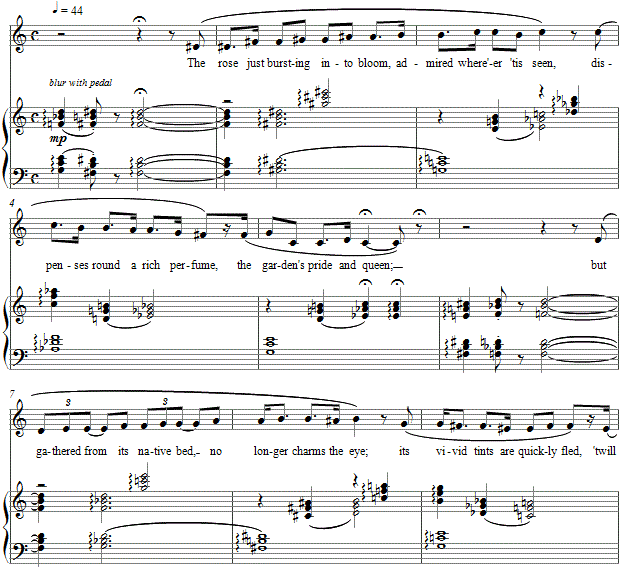Music and Texts of GARY BACHLUND
Vocal Music | Piano | Organ | Chamber Music | Orchestral | Articles and Commentary | Poems and Stories | Miscellany | FAQs
Song - (2012)
Susanna Haswell Rowson
for mezzo soprano
The rose just bursting into bloom,
Admired where'er 'tis seen,
Dispenses round a rich perfume,
The garden's pride and queen;
But gathered from its native bed,
No longer charms the eye;
Its vivid tints are quickly fled,
'Twill wither, droop and die.
So woman, when by nature drest
In charms devoid of art,
Can reign sole empress in each breast,
Can triumph o'er each heart;
Can bid the soul to virtue rise,
To virtue prompt the brave;
But sinks oppressed, and drooping dies,
If once she's made a slave.
2 pages, circa 2' 40"
Susan Haswell Rowson
Susanna Rowson, née Haswell (1762–1824) was a American novelist, poet, playwright, actress and educator, and is known for Charlotte, a Tale of Truth, said to have been the most popular American novel until Harriet Beecher Stowe's Uncle Tom's Cabin was published in 1852. Additionally she ran a school for women in Boston, and edited the Boston Weekly Magazine. Parenthetically, it is interesting that women rank among the popular writers of the United States, long before the women's movement of today declared itself champion of such issues. In all this, Rowson was supported by her husband, and they even acted together in a comic opera written by her, Slaves in Algiers (1794).
This is among the personal reasons that I do not place much stock in movements which claim to represent classes and identifies of groups, when it is the value and merit of the work which abides past an age's "movements." Given the attacks on women in the so-called "Arab Spring," as with the brutal culture of "honor killings," as with the 60s "free love" movement and even slurs freely spoken in Western media against women on both sides of the political aisle, one sees the wisdom of Rowson's simple and yet audacious verse. We see today playing out the notion of freedom for individual women against the various social phenomena of enslavement of women, and the poet reminds us that our choice, goal and vision should be for freedom, never slavery.
The setting is a gentle polytonal underpinning of the vocal line, demanding melodic shapes to wed with it. The eighth note rests may be slightly elongated, as if halting a moment and the last in sets of two fermati should be longer than the first. The harmonic progression subtly drops as each four lines pass, as the sentiment of the text suggests.
The score for Song is available as a free PDF download, though any major commercial performance or recording of the work is prohibited without prior arrangement with the composer. Click on the graphic below for this piano-vocal score.

